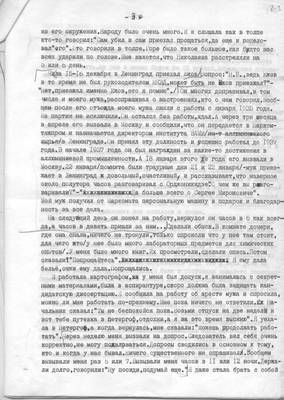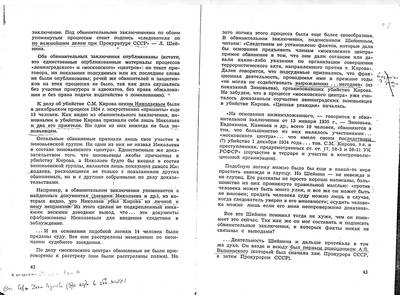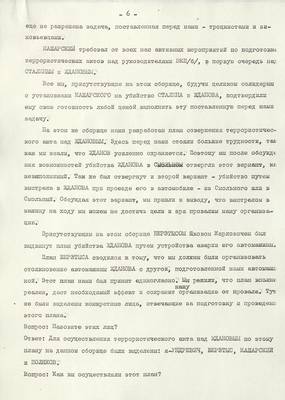Nikolaev Leonid Vasilievich
The killer of S.M. Kirov
Genus. in 1904 in St. Petersburg. In 1923–1925 mechanic at the Leningrad plant "Krasnaya Zarya". In 1925–1926 manager of the affairs of the Luga district committee of the Komsomol. In 1926–1931 cultural worker at the construction of the institute, planer at the Leningrad factories "Red Arsenal" and them. K. Marx. In 1931–1933 instructor-referent of the Leningrad Regional Committee of the All-Union Communist Party (Bolsheviks), head of the financial sector of the Leningrad Regional Council of the “Down with Illiteracy” society, price inspection inspector of the Leningrad Regional KK-RKI. In 1933–1934 instructor at the Institute of Party History at the Leningrad Regional Committee of the All-Union Communist Party of Bolsheviks. On 12/01/1934 he committed the murder of S.M. Kirov, was then arrested. On December 28–29, 1934, he was sentenced to military service by the Military Collegium of the Supreme Court. Shot. 11/30/1990 Plenum of the Supreme Court of the USSR verdict in terms of conviction under Art. 58-11 of the Criminal Code of the RSFSR was canceled, and the rest of the sentence was left unchanged.
Documents (16)
Fund 06 / Inventory 1 / Case Тер-Асатурова Елена Александровна
1. Memoirs of Ter-Asaturova E. A. “Memories are not given to fade away”, written in Tbilisi in 1971-1973. (attached file)
Acquaintance with M.L. Ter-Asaturov. Acceptance of the author into the troupe of the Rustaveli Theatre. success in the theatre. Ter-Asaturov gets a job at the Krasny Putilovets plant. 1929 He is sent to America as an English speaker to study the mass production of tractors at the Ford factories. Upon return, meeting with the author in Tbilisi, marriage proposal. 1929 Parting with the theater, departure to Leningrad. Happy married life in Leningrad. The second trip of Ter-Asaturov to America to the Ford factories. The author, meanwhile, is filming in the film "The Caucasian Robber" by Mikhail Gelovani. An attempt to draw up documents for traveling to America to her husband, a refusal to issue a visa, as it turns out, because of the author's noble origin. The author is going to work at the Bolshoi Drama Theatre. Ter-Asaturov is adjusting the equipment brought from America for the reconstruction of the plant. In 1931, the plant produced 32,000 tractors, for which Ter-Asaturov was awarded the Order of Lenin. At this time, he holds the position of technical director of the plant.
The author plays with great success on the stage of the BDT, masters the profession of a ballerina, herself dances to the music of Rubinstein. The couple spend the summer months in the Caucasus. A case of getting into a car accident in the mountains is described, from which the author and her husband miraculously managed to escape. The author leaves the BDT and enters the concert organization of the House of the Red Army, thus switching to pop activities - to artistic reading. Ter-Asaturov decides to organize the production of powerful cars at the plant on the basis of tractor workshops. The American Buick was taken as a model. Soon 6 cars Leningrad-1 (L-1) were ready, they successfully passed the test. A government order was received for 2,000 vehicles. By order of the People's Commissariat of Heavy Industry, the automotive industry was canceled, and it was proposed to engage in military orders. Kirov's assassination. Rallies at the Krasny Putilovets plant. Renaming the plant to the Kirov Plant. The suicide of the husband of Ter-Asaturov's niece, the cause of which remains unknown, the arrest of the chief director of the theater Rustaveli Akhmeteli and his wife Tamara Tsulukidze are harbingers of the beginning of repression. Arrests at the factory. The author notes the general atmosphere of distrust, anxiety, wariness. Removal from the post of director of the Kirov plant Ter-Asaturov. Likhachev, who promised to take him to his factory, does not keep his promise. exclusion from the party. The arrest of Ter-Asaturov on November 20, 1937.
Waiting for the arrest by the author, selling things for next to nothing, renting out an apartment. A call from the NKVD, forcing Ter-Asaturov to believe that his wife was not arrested and to sign the papers. Three months later, the sentence became known - 10 years without the right to correspond.
Arrest of the author on March 16, 1938 after her return from a tour. Arsenal prison. There are 40 women in the cell, almost all of them are wives of arrested husbands who held responsible positions. Those arrested read out the sentence to imprisonment for 8 or 5 years. The author gets 8 years. Appointment stage after two months of imprisonment. Stage in the overfilled teplushki. Arrival in Mordovia, in Temnikovsky penal camps. Description of the camp zone - there were up to 1500 people in one site, there were 24 zones-sites in total. Work in the zone. The author chooses work in the "fresh air" - carrying bricks and stretchers, uprooting stumps. Food - oatmeal and oatmeal, soy coffee.
Description of work in the garment industry - stuffiness, mosquitoes. The author describes his ability to disconnect from reality, presenting the theater. Then again work in the air - to pump water from the well, and on the second shift - in the kitchen. Lelya Rubinstein's friend. The author learned to smoke shag by twisting goat's legs. Garlic grated on a crust of black bread served as a delicacy. After a 1.5-year stay in the camp, correspondence and parcels were allowed. The author was allowed to organize a reading concert.
Another stage. This time arrival in Karelia, in Segezha. Work in general works. The author takes on the organization of concerts, bypassing the barracks and agitating the prisoners. Primitive musical instruments were found. Concert toilets were obtained from the house.
Concerts began to take place regularly. Soloists are released from work and live in a separate section. The author emphasizes all the time the paramount importance for himself of the spiritual life. Performs as a reader and as a dancer. Teaming up with a team of male actors, under the direction of the actor Dulenkov, plays begin to be staged. Arrival of Nora's half-sister with her daughter.
After the beginning of the Great Patriotic War, the position of the artists changed. They are again sent to work, settled in a common barracks. After the destruction of the hospital and school during the raid, a new stage is being assembled. A journey of 60 days in a wagon in terrible conditions. The author is amazed at the number of camps that come across along the way.
Arrival in Karganopol camps, northern Kazakhstan, however, due to lack of free places, they move on. The path on foot is 50 km. Arrival at the Karabass camp. After 10 days - a new route, arrival in the village of Dolinka, Karaganda region, distribution to the Manzhin site. Life in the stables. Transfer to the Karadzhar branch as an actress to prepare concerts. Artists are put on easier work. The author works as a cleaner and stoker. Concerts are prepared every month. The concerts are closed for the summer, and the author finds a job as a hairdresser's assistant. Description of the arrived stage with the imprisoned Chechens and Ingush, who expressed sympathy for the Germans. An epidemic disease of malaria, which did not bypass the author, was treated with quinine and quinine. The emergence of a romantic relationship with a member of the troupe Ivan Danilov. The author cites letters from grateful listeners. Again moving to Dolinka troupe, the construction of the House of Culture. The author, as part of the troupe, works in the club until his release. Operettas were staged, the author takes part in them as a choreographer. The team already included a dresser, an artist, a choir, and professional dancers. Performances, concerts, performances were replaced by bouts of malaria. End of term March 16, 1946. Roads and transport are loaded with demobilized people, it is impossible to leave Kazakhstan. The author remains to work as a civilian in the Central Club, then in Karaganda. Departure to Leningrad to see sister Nora. The city amazes with houses destroyed, pitted with shells.
Meeting with Gurevich and Zeiliger. The request to live in Leningrad was denied. The author leaves for Tbilisi. Meeting with friends. Registration, employment in the Philharmonic. Proposal to leave Tbilisi within 10 days. The author leaves for Riga, to visit a friend. However, after some time he returns to Tbilisi, manages to get a residence permit with the help of friends and get a job at the Philharmonic. After the start of re-passportization, she was again deported from Tbilisi, however, with the assistance of the Committee for Arts and the Philharmonic, she manages to return. In the future, the author works in the Philharmonic, travels a lot around the cities of Georgia. Prohibition to work in government concerts. In January 1953, the expulsion of "wives" begins, but the death of Stalin stops this. In 1954 documents about the rehabilitation of the author and her husband arrive, from which it becomes clear that the husband was shot immediately after his arrest. The author begins to work in an ensemble of Chongurists. After rehabilitation, he gets the opportunity to speak in Moscow, before members of the government. In May 1956, the author moved to Leningrad, having received living space from the Kirov Plant. Retirement. Music lessons with Zeiliger, just like 43 years ago. Three years later, moving to his homeland, in Tbilisi. Work as a tutor.
The text includes poems dedicated to the author, as well as the author's own translations from Georgian into Russian.
Annotation compiled by Brodskaya N.K.
Fund 02 (Б-1) / Inventory 1 / Case Родионова Наталья Борисовна
2. Memories of Rodionova N.B., with attached copies of certificates of her release (No. 452 18-317010 dated 16.12.1942), rehabilitation (No. 2898 dated 11.09.1956), and rehabilitation of Rodionov N.A. (No. 4n-014778/56 dated 16.10.1956).












Fund 03 (Б-2) / Inventory 1 / Case Орловский Эрнст Семенович
2. Letter from Orlovsky E.S. in the newspaper “Komsomolskaya Pravda” about the lawyer and writer Sheinin L.R., who was an investigator for particularly important cases in the 1930s, published in the samizdat magazine “Political Diary” No. 3 for December 1964.




Fund 017 (К-1) / Inventory 1 / Case Батий Юрий Юрьевич
02. Protocol of interrogation of Batia Yu.Yu. dated 03/06/1938.
Fund 02 (Б-1) / Inventory 1 / Case Родионова Наталья Борисовна
3. Autobiographical memoirs of Rodionova N.B.









Fund 017 (К-1) / Inventory 1 / Case Батий Юрий Юрьевич
03. Record of interrogation Luba Yu.B. from 04/29/1938.
Fund 03 (Б-2) / Inventory 10 / Case Дело по обвинению Пименова Р.И. и других, в 10 томах, т. 6
3. Report of the First Secretary of the CPSU Central Committee N.S. Khrushchev To the XX Congress of the CPSU 02/25/1956 “On the cult of personality and its consequences, with comments by R.I. Pimenov and an inscription by L.M. Shcherbakova: “Seized during a search in my room on 03/25/1957. It was in my son's books." An envelope with evidence.





















Fund 017 (К-1) / Inventory 1 / Case Батий Юрий Юрьевич
04. Protocol confrontation between the accused Batiya Yew.Yew. and Lyuba Yu.B. dated 05/22/1938.






Fund 02 (Б-1) / Inventory 1 / Case Родионова Наталья Борисовна
4. Interview with Rodionova N.B., recorded by Kosinova T.F., in 2 parts. (attached file)
Fund 03 (Б-2) / Inventory 1 / Case Юрасов Дмитрий Геннадьевич
5. Yurasov D. “The mechanism of terror” (introductory article “A few words about the collector” by I. Polotsk) in the magazine “Daugava”. 1989, no. 4.






Fund 017 (К-1) / Inventory 1 / Case 059
7. Record of interrogation of Undrevich V.S. dated 09/16/1937.
8 sheets, photocopy of a typewritten copy.








Fund 017 (К-1) / Inventory 1 / Case Батий Юрий Юрьевич
11. Resolution of the UMGB for the Arkhangelsk region dated 02/09/1950 on the arrest of Lyuba Yu.B.



Fund 02 (Б-1) / Inventory 1 / Case Либерман Лев Борисович
11. Extracts from the archival investigative case No. 23233-1937 regarding Lieberman L.B., made by his daughter.

































Fund 017 (К-1) / Inventory 1 / Case Батий Юрий Юрьевич
22. Certificate of the UMGB in the Arkhangelsk region dated 09/16/1950 on Baty Yu.Yu.









Fund 016 / Inventory 1 / Case 9
66-2. Conclusion of the Military Prosecutor's Office of the Baltic Fleet dated March 29, 1996 on the rehabilitation of B.P. Lunkov.

Fund 016 / Inventory 1 / Case 10
81-5. Archival certificate of the Federal Security Service of the Russian Federation for St. Petersburg and Leningrad Region No. 10 / 51-915 dated 05/13/1999 on Makarov A.M.
